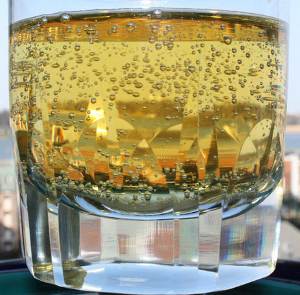In chemistry, a precipitate is an insoluble solid that emerges from a liquid solution. The emergence of the insoluble solid from solution is called precipitation. Often the precipitate emerges as a suspension.
Precipitates can form when two soluble salts react in solution to form one or more insoluble products.


Precipitates can also form when the temperature of a solution is lowered. Lower temperatures reduce the solubility of salts, which may result in their precipitation as solids.
In general, precipitation happens when one phase is ejected from another - a liquid ejects a solid, or a gas ejects a liquid or solid.
In weather forecasts, you'll hear presenters talk about precipitation, which can mean water vapor in the air is ejected as a liquid (rain) or solid (snow, hailstones, etc.) from the air.
A Common Precipitation
If you've ever made wine, beer, or fruit juices, one of the stages you'll often go through is fining, which removes dissolved substances that would otherwise worsen the taste of the drinks.
A fining agent binds to soluble substances such as proteins, polyphenols and sulfides, causing them to form a precipitate that drops to the bottom of the liquid for easy removal.
Fining agents include egg whites and bentonite.
A Famous, Uncommon Precipitate
A precipitate was famously and cleverly the murder method used by Agatha Christie in her first novel The Mysterious Affair at Styles, which features strychnine poisoning.
The victim was taking medicine that contained a small amount of dissolved strychnine. There was too little strychnine in a single dose to cause harm. However, if all the strychnine in the bottle were taken at once, it would be fatal!
The strychnine in the medicine was in the form of strychnine sulfate. The murderer added potassium bromide to the medicine, which reacted with the strychnine sulfate to form strychnine bromide, a transparent insoluble salt. This salt precipitated and fell to the bottom of the bottle.
When the victim took the final dose of medicine, it contained a lethal dose of transparent strychnine bromide salt.
In Agatha Christie's words:
"Do you mean that the murderer introduced the strychnine into her tonic?" Captain Hastings cried.
Hercule Poirot explained:
"There was no need to introduce it. It was already there - in the mixture. The strychnine that killed Mrs. Inglethorp was the identical strychnine prescribed by Dr. Wilkins.
"...A lady in England lost her life by taking a similar mixture: the precipitated strychnine collected at the bottom, and in taking the last dose she swallowed nearly all of it!"

